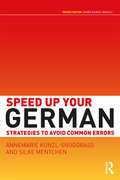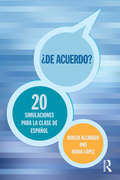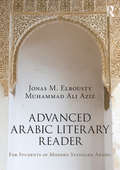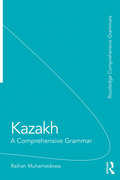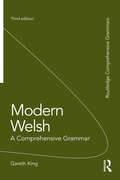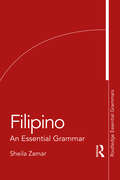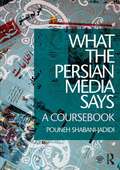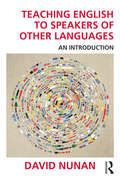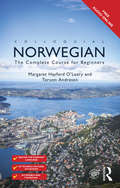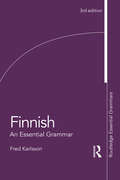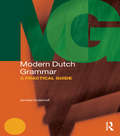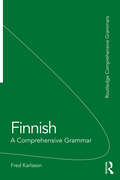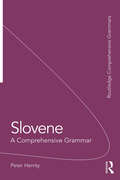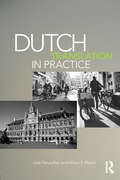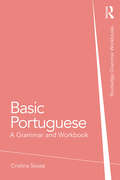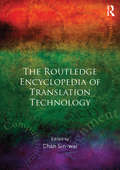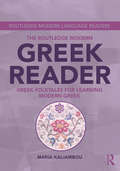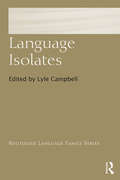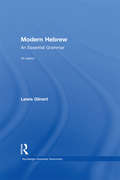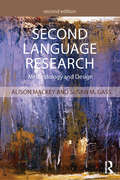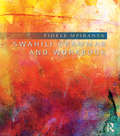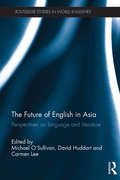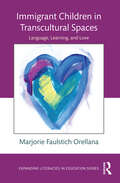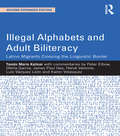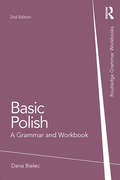- Table View
- List View
Speed up your German: Strategies to Avoid Common Errors
by Silke Mentchen Annemarie Kunzl-SnodgrassSpeed Up Your German is a unique and innovative resource that identifies and explains the errors most commonly made by learners of German, enabling students to learn from their mistakes while enhancing their understanding of the German language. Each of the eighteen chapters focuses on a grammatical category where English speakers typically make mistakes. Each chapter is subdivided into two levels: Level 1 explains the root cause of the error while level 2 goes deeper into the grammar allowing students to choose the level they want to work at. Each point is clearly explained and exemplified and a range of exercises reinforce learning. Suitable both for classroom use or self-study, Speed Up Your German is the ideal resource for all intermediate learners of German wishing to refine their language skills.
¿De acuerdo? 20 simulaciones para la clase de español
by Noelia Alcarazo Lopez López Nuria¿De acuerdo? 20 Simulaciones para la clase de español es el manual perfecto para estudiantes de español de nivel intermedio y avanzado que quieren desarrollar su destreza oral. El libro presenta 20 simulaciones que proporcionan un marco eficaz y motivador para el desarrollo de la destreza oral y la producción del habla espontánea. Los estudiantes asumen un papel que les permite expresar opiniones, discutir y debatir dentro de un contexto significativo, preparándolos para situaciones de la vida real. ¿De acuerdo? 20 Simulaciones para la clase de español is the ideal course for intermediate to advanced students of Spanish seeking to develop their speaking skills. The book presents 20 simulations which provide an effective and motivating framework for developing speaking skills and producing spontaneous speech. Students take on a role allowing them to express opinions, argue and debate within a meaningful context that prepares them for real-life situations.
Advanced Arabic Literary Reader: For Students of Modern Standard Arabic
by Jonas Elbousty Muhammad AzizAdvanced Arabic Literary Reader is a truly representative collection of literary extracts from across the Arabic-speaking world. Extracts from each country in the Arab world have been carefully selected, with a balance of both male and female writers and prominent and emerging voices, providing a unique window into the Arab world. ? Suitable for both class use and independent study, each extract is supported by an introduction to the author, pre-reading activities, comprehension questions and discussion questions. These activities are designed to help learners expand and reinforce their vocabulary, develop their oral and written proficiency and stimulate further exploration of the cultural and historical background of the texts. ? Written entirely in Arabic, the Advanced Arabic Literary Reader is an essential text for advanced students who wish to further their reading, speaking, and writing ability in Modern Standard Arabic. Free audio recordings of the extracts are available online at www.routledge.com/books/details/9781138828698/ to enable students to improve listening skills.
Kazakh: A Comprehensive Grammar (Turcologica Ser. #102)
by Raikhangul MukhamedovaKazakh: A Comprehensive Grammar is the first thorough analysis of Kazakh to be published in English. The volume is systematically organized to enable users to find information quickly and easily, and provides a thorough understanding of Kazakh grammar, with special emphasis given to syntax. Features of this book include: descriptions of phonology, morphology and syntax; examples from contemporary usage; tables summarizing discussions, for reference; a bibliography of works relating to Kazakh. Kazakh: A Comprehensive Grammar reflects the richness of the language, focusing on spoken and written varieties in post-Soviet Kazakhstan. It is an essential purchase for all linguists and scholars interested in Kazakh or in Turkic languages as well as advanced learners of Kazakh.
Modern Welsh: A Comprehensive Grammar (Routledge Comprehensive Grammars)
by Gareth KingModern Welsh: A Comprehensive Grammar is the ideal reference source for all speakers and learners of Welsh. Focusing on contemporary spoken Welsh, it presents the complexities of the language in a concise and readable form. Common grammatical patterns and parts of speech are discussed in detail and without jargon and extensive cross references make the book comprehensive and easy to use. Now in its third edition, the Grammar has been thoroughly revised and updated throughout. Changes include an increased number of illustrative examples, additional appendices for easy reference, inclusion of IPA phonetic symbols, and expanded sections on further reading. Features include: Full use of authentic examples Particular attention to areas of confusion and difficulty Extensive index and cross referencing Initial consonant mutations marked throughout Separate sections on communicative functions Notes on variation between dialects and on formal written language Modern Welsh: A Comprehensive Grammar is the most thorough, detailed and user-friendly Welsh grammar available in English today. It is suitable for use in schools, colleges, universities and adult classes at all levels and will, as its predecessors, prove an invaluable aid for Welsh language learning and teaching.
Filipino: An Essential Grammar (Routledge Essential Grammars)
by Maria Sheila ZamarFilipino: An Essential Grammar is a comprehensive and practical reference guide introducing the key grammatical forms and structures in the Filipino language. This book offers a detailed exploration of key phonological, morphological, and syntactic features of Filipino that are essential to achieving high levels of proficiency in the language. Across 14 chapters are concise explanations of important grammatical categories and linguistic features relevant in the description of Philippine languages, complemented by examples relevant for everyday conversations and easy-to-understand rules for navigating Filipino grammar. Taking into consideration the most salient grammatical aspects that need to be presented by teachers and mastered by learners of Filipino, this is the ideal reference grammar for researchers, teachers, and learners of the Filipino language. This book is designed for both independent and class-based studies by learners of Filipino at all levels.
What the Persian Media says: A Coursebook
by Pouneh Shabani-JadidiWhat the Persian Media Says: A Coursebook is a comprehensive and stimulating course for intermediate to advanced students of Persian. Presenting many exercises based on authentic Persian newspaper texts, the course thoroughly introduces students to the language of the news in Iran. Real cultural content is featured throughout and there is a strong focus on enabling students to gain familiarity with day-to-day modern Persian discourse. Features include: A wide range of interesting and challenging exercises presented throughout, including activities designed to both test students’ knowledge in a classroom setting and to search online for further Persian news resources Usage of authentic texts from the Iranian media, written for native speakers, with sources including Ettel?’?t, Keyh?n, Sharq, E’tem?d, Ir?n, and Mardoms?l?ri Coverage of topics highly relevant to modern day Persian society, including the Arts, divorce, violence, problems of youth, unemployment, politics and economic issues, enabling cultural engagement and knowledge of complex expressions and idioms used in the media A comprehensive bilingual glossary of journalistic and non-journalistic terminology used in the newspaper texts, provided at the back of the book for easy access All the newspaper texts and their corresponding audio files available for free download at http://routledgetextbooks.com/textbooks/9781138825567/ What the Persian Media Says combines modern and more traditional techniques of language teaching. With all the newspaper texts and their corresponding audio files available for free on the Routledge website, students can read the texts in digital form and listen to the audio while working on exercises in the book, enabling full and exciting engagement with the course materials. Written by an experienced instructor, this will be an invaluable resource for intermediate to advanced undergraduate and postgraduate students of Persian. It can also be used by self-learners and by instructors and students on intensive courses and summer language programs.
Teaching English to Speakers of Other Languages: An Introduction
by David NunanDavid Nunan's dynamic learner-centered teaching style has informed and inspired countless TESOL educators around the world. In this fresh, straightforward introduction to teaching English to speakers of other languages he presents teaching techniques and procedures along with the underlying theory and principles. Complex theories and research studies are explained in a clear and comprehensible, yet non-trivial, manner without trivializing them. Practical examples of how to develop teaching materials and tasks from sound principles provide rich illustrations of theoretical constructs. The content is presented through a lively variety of different textual genres including classroom vignettes showing language teaching in action, question and answer sessions, and opportunities to 'eavesdrop' on small group discussions among teachers and teachers in preparation. Readers get involved through engaging, interactive pedagogical features and opportunities for reflection and personal application. Each chapter follows the same format so that readers know what to expect as they work through the text. Key terms are defined in a Glossary at the end of the book. David Nunan's own reflections and commentaries throughout enrich the direct, up-close style of the text.
Colloquial Norwegian: The Complete Course for Beginners (Colloquial Series)
by Margaret Hayford O'Leary Torunn AndresenColloquial Norwegian provides a step-by-step course in Norwegian as it is written and spoken today. Combining a user-friendly approach with a thorough treatment of the language, it equips learners with the essential skills needed to communicate confidently and effectively in Norwegian in a broad range of situations. No prior knowledge of the language is required. Features include: progressive coverage of speaking, listening, reading and writing skills structured, jargon-free explanations of grammar an extensive range of focused and stimulating exercises realistic and entertaining dialogues covering a broad variety of scenarios useful vocabulary lists throughout the text additional resources available at the back of the book, including a full answer key, a grammar summary and bilingual glossaries Balanced, comprehensive and rewarding, Colloquial Norwegian will be an indispensable resource both for independent learners and students taking courses in Norwegian. Colloquials are now supported by FREE AUDIO available online. All audio tracks referenced within the text are free to stream or download from www.routledge.com/cw/colloquials. Recorded by native speakers, the audio compliments the book and will help enhance learners’ listening and speaking skills.
Finnish: A Comprehensive Grammar (Routledge Essential Grammars)
by Fred KarlssonThis thoroughly revised third edition of Finnish: An Essential Grammar is grounded in fundamental insights of modern linguistics and incorporates some of the latest achievements in the description of written and spoken Finnish. It gives a systematic account of the structures of the written language and offers increased attention to the key characteristics of present-day colloquial Finnish. No prior knowledge is assumed on the part of the reader and grammatical rules are clearly explained without jargon. Features of this new edition include: • pronunciation guide, including the tendencies in present-day colloquial Finnish • thorough descriptions of morphology (word structure) and syntax (sentence structure) • clear rules and an abundance of concrete examples, from both written and colloquial Finnish • updated vocabulary in the examples • an effective new scheme for detecting the morphological structure of any word form • subject index. This is the ideal reference source both for those studying Finnish independently and for students in schools, colleges, universities and adult classes of all types.
Modern Dutch Grammar: A Practical Guide (Modern Grammars)
by Jenneke OosterhoffModern Dutch Grammar: A Practical Guide is an innovative reference guide to Dutch, combining traditional and function-based grammar in a single volume. With a strong emphasis on contemporary usage, all grammar points and functions are richly illustrated with examples. The Grammar is divided into two parts. Part I covers traditional grammatical categories such as nouns and verbs. Part II is carefully organized around language functions and contexts such as: Giving and seeking information Describing processes and results Expressing attitudes, mental states and emotions Registers and style Formal and informal communication, e.g. youth talk Main features of the Grammar include: Clear, succinct and jargon-free explanations Extensive cross-referencing between the different sections Emphasis on areas of particular difficulty for learners of Dutch This is the ideal reference grammar for learners of Dutch at all levels, from elementary to advanced; no prior knowledge of grammatical terminology is assumed and it provides indices of grammatical terms and functions. This Grammar is complemented by a companion website featuring related exercises and activities to reinforce learning.
Finnish: A Comprehensive Grammar (Routledge Grammars)
by Fred KarlssonFinnish: A Comprehensive Grammar presents a fresh, accessible and thorough description of the language, concentrating on the real patterns of use in modern Finnish. The book moves from the sound system through morphology and word classes to a detailed analysis of sentence structures and semantic features. Key features include: particular focus on examples from spoken Finnish reflecting current usage, grammatic phenomena classified as common or rare, appendices distinguishing base forms from final letter combinations, English-Finnish contrasts highlighted throughout. This Comprehensive Grammar is an essential reference for the intermediatre and advanced learner and user of Finnish.
Slovene: A Comprehensive Grammar (Routledge Comprehensive Grammars)
by Peter HerritySlovene: A Comprehensive Grammar is the most complete reference guide to the contemporary language. Key features of this new edition include: updated examples reflecting current usage, expanded discussions of particular areas of difficulty, a brief history of the language, dialects and register, clear distinction between written and spoken usage, new tables and charts for quick reference. The Grammar provides a jargon-free and systematic description of all parts of speech promoting an in-depth understanding of the Slovene language. Slovene: A Comprehensive Grammar is a key resource for linguists and students of Slovene at intermediate and advanced levels.
Dutch Translation in Practice
by Jane Fenoulhet Alison MartinDutch Translation in Practice provides an accessible and engaging course in modern Dutch translation. Taking a highly practical approach, it introduces students to the essential concepts of translation studies, heightens their awareness of the problems posed in Dutch translation, and teaches them how to tackle these difficulties successfully.? Featured texts have been carefully chosen for their thematic and technical relevance, and a wide range of discursive and grammatical issues are covered throughout.? Features include: Nine chapters reflecting different areas of contemporary life and culture in Belgium and the Netherlands? such as People and Places, Dutch Language and Culture, Literature, Employment, Finance and Economics, Media and Communications, Art History and Exhibitions, Fashion and Design and the Earth, Energy and the Environment Authentic extracts drawn from up-to-date Dutch texts used throughout to illustrate and practise various topical and translation issues, with many supporting exercises and open translation activities to encourage active engagement with the material, the? development of strong translation skills, and vocabulary acquisition Chapters structured to provide progressive learning, moving from an introductory section explaining the context for the texts to be translated to information on translation techniques, detailed close readings and analyses of words, phrases, style, register and tone A strong focus throughout on addressing issues relevant to contemporary Dutch translation, with practical tips offered for translating websites, dealing with names and handling statistics and numbers in translation Attention to language areas of particular difficulty, including translating ‘er’, passive constructions, punctuation, conjunctions and separable verbs Helpful list of grammatical terms, information on useful resources? for translators and sample translations of texts available at the back of the book Written by experienced instructors and extensively trialled at University College London, Dutch Translation in Practice will be an essential resource for students on upper-level undergraduate, postgraduate or professional courses in Dutch and Translation Studies.
Basic Portuguese: A Grammar and Workbook (Grammar Workbooks)
by Cristina SousaBasic Portuguese: A Grammar and Workbook comprises an accessible reference grammar and related exercises in a single volume. Twenty units cover the core material which students can expect to encounter in their first year of learning Portuguese. Grammar points are followed by examples and exercises which allow students to reinforce and consolidate their learning. Clearly presented and user-friendly, Basic Portuguese provides readers with a thorough grounding in the fundamentals of Portuguese grammar.
Routledge Encyclopedia of Translation Technology
by Sin-Wai ChanThe Routledge Encyclopedia of Translation Technology provides a state-of-the art survey of the field of computer-assisted translation. It is the first definitive reference to provide a comprehensive overview of the general, regional and topical aspects of this increasingly significant area of study. The Encyclopedia is divided into three parts: Part One presents general issues in translation technology, such as its history and development, translator training and various aspects of machine translation, including a valuable case study of its teaching at a major university; Part Two discusses national and regional developments in translation technology, offering contributions covering the crucial territories of China, Canada, France, Hong Kong, Japan, South Africa, Taiwan, the Netherlands and Belgium, the United Kingdom and the United States Part Three evaluates specific matters in translation technology, with entries focused on subjects such as alignment, bitext, computational lexicography, corpus, editing, online translation, subtitling and technology and translation management systems. The Routledge Encyclopedia of Translation Technology draws on the expertise of over fifty contributors from around the world and an international panel of consultant editors to provide a selection of articles on the most pertinent topics in the discipline. All the articles are self-contained, extensively cross-referenced, and include useful and up-to-date references and information for further reading. It will be an invaluable reference work for anyone with a professional or academic interest in the subject.
The Routledge Modern Greek Reader: Greek Folktales for Learning Modern Greek
by Maria KaliambouThe Routledge Modern Greek Reader has been specially designed for post-beginners to advanced learners of Greek. Written by an experienced instructor, this innovative reader offers both students and teachers of Modern Greek the pedagogical tools to utilise richly textured folktale material in a language class. Students can develop their linguistic skills while simultaneously engaging with the broader social and cultural context of the language. Features include: Twenty five readings organised according to level of difficulty, beginning with easy short stories and progressing onto more advanced level texts Vocabulary lists with English translations and vocabulary in context supporting each reading Comprehension questions in each chapter to help foster stronger reading and writing skills Language exercises and subject specific tasks to stimulate classroom discussion and help students develop strong essay writing skills in Greek Three folktales presented in different dialects at the end of the book to help students understand variety within the Greek language itself A complete Greek-English glossary and a list of all idiomatic expressions and colloquial phrases found in the folktales. Suitable for both class use and independent study, The Routledge Modern Greek Reader is an essential tool for increasing language proficiency skills and enriching students’ cultural knowledge.
Language Isolates (Routledge Language Family Series)
by Jessica KeyesLanguage Isolates explores this fascinating group of languages that surprisingly comprise a third of the world’s languages. Individual chapters written by experts on these languages examine the world's major language isolates and language isolates by geographic regions, with up-to-date descriptions of many, including previously unrecorded language isolates. Each language isolate represents a unique lineage and a unique window on what is possible in human language, making this an essential volume for anyone interested in understanding the diversity of languages and the very nature of human language. Language Isolates is key reading for professionals and students in linguistics and anthropology.
Modern Hebrew: An Essential Grammar (Routledge Essential Grammars Ser.)
by Lewis GlinertThis fourth edition of Hebrew: An Essential Grammar includes expanded coverage of some of the key areas of Hebrew grammar including roots, adverbs and nouns. Additional examples have been added throughout to further clarify many of the grammar points with illustrations from current usage. The Grammar serves as a reference source for the learner or user of Hebrew irrespective of level, by setting out the complexities of the language in short, readable sections that are clear and free from jargon. It is ideal both for independent study and for students on taught course.
Second Language Research: Methodology and Design
by Alison Mackey Susan M. GassIn this second edition of the best-selling Second Language Research, Alison Mackey and Sue Gass continue to guide students step-by-step through conducting the second language research process with a clear and comprehensive overview of the core issues in second language research. Supported by a wealth of data examples from actual studies, the book examines questions of what is meant by research and what defines good research questions, covering such topics as basic research principles and data collection methods, designing a quantitative research study, and concluding and reporting research findings. The second edition includes a new chapter on mixed-methods, new "time to think" and "time to do" text boxes throughout, and updates to reflect the latest research and literature. Supplementary materials, including an extensive glossary and appendices of forms and documents that students can use in conducting their own studies, serve as useful reference tools, with suggestions on how to get research published reemphasizing the book’s practical how-to approach. Second Language Research, Second Edition is the ideal resource for understanding the second language research process for graduate students in Second Language Acquisition and Applied Linguistics.
Swahili Grammar and Workbook
by Fidèle MpiranyaSwahili Grammar and Workbook provides a practical and comprehensive companion to Swahili grammar, filling in gaps left by other textbooks. Presenting the essentials of Swahili grammar in a highly accessible fashion, it reduces complex language topics to helpful rules and mnemonic aids, enabling maximum grammar retention and accurate usage. Grammar points are followed by multiple examples and exercises, allowing students to consolidate and practice their learning. No prior knowledge of linguistic terminology is required. Key features include: Twenty five language notes covering key topics such as: personal pronouns; the Swahili noun class system; special class combinations; the imperative, the subjunctive, and the conditional moods; the use of comparatives; the use of monosyllabic verbs; the passive form and various other forms of verb extensions; the relative clause Clear, detailed and jargon-free grammatical explanations supported by an assortment of helpful diagrams, charts and tables and many relevant and up-to-date examples A wide range of communication-oriented exercises to reinforce learning and develop students’ ability to use Swahili actively Audio files to support pronunciation practice, clearly linked to relevant sections of the book and available for free download at http://www.routledge.com/books/details/9781138808263/ Four appendices, Swahili-English and English-Swahili vocabulary lists, a bibliography and an index presented at the back of the book for easy access to information. Written by a highly experienced instructor, Swahili Grammar and Workbook will be an essential resource for all students and teachers of Swahili. It is suitable for use both as a companion reference text in language courses and as a standalone text in independent grammar classes.
The Future of English in Asia: Perspectives on language and literature (Routledge Studies in World Englishes)
by David Huddart Michael O'Sullivan Carmen LeeThis collection is unique in bringing together key thinkers on language and literature to discuss the future of English in Asia. Many of the contributors are themselves responsible for important sub-genres in English linguistics and literary studies and this collection gives them the opportunity to respond to each other directly. The different chapters also respond to different contemporary debates and emerging trends and discourses that are hugely important for the future of English language teaching in schools across Asia. This volume is also ground-breaking in bringing English literary studies and Applied English Linguistics together in the contemporary Asian context. The Future of English in Asia includes studies on the following subject areas: Cultural Translation in World Englishes, Multilingual Education, English Futures and the function of Literature, English Literary Studies in Japan, and English and Social Media in Asia. Well into this century, it appears that it is still very difficult to know what to expect when it comes to the future of English. The future of English will continue to be determined by complex local contexts. As it has in other parts of the world, the future of English in Asia will continue to rely on the proliferation of its transformations as much as its hegemonic status. This volume reflects the widespread acknowledgement that whatever future English has will inevitably be shaped by its fate in Asia. The collection will be a welcome resource for scholars and students of English linguistics, English literary studies, and topics related to the teaching of English in Asia.
Immigrant Children in Transcultural Spaces: Language, Learning, and Love (Expanding Literacies in Education)
by Marjorie Faulstich OrellanaGrounded in both theory and practice, with implications for both, this book is about children’s perspectives on the borders that society erects, and their actual, symbolic, ideational and metaphorical movement across those borders. Based on extensive ethnographic data on children of immigrants (mostly from Mexico, Central America and the Philippines) as they interact with undergraduate students from diverse linguistic, cultural and racial/ethnic backgrounds in the context of an urban play-based after-school program, it probes how children navigate a multilingual space that involves playing with language and literacy in a variety of forms. Immigrant Children in Transcultural Spaces speaks to critical social issues and debates about education, immigration, multilingualism and multiculturalism in an historical moment in which borders are being built up, torn down, debated and recreated, in both real and symbolic terms; raises questions about the values that drive educational practice and decision-making; and suggests alternatives to the status quo. At its heart, it is a book about how love can serve as a driving force to connect people with each other across all kinds of borders, and to motivate children to engage powerfully with learning and life.
Illegal Alphabets and Adult Biliteracy: Latino Migrants Crossing the Linguistic Border, Expanded Edition
by Tomás Mario KalmarHow do "illegal aliens" chart the speech sounds of colloquial English? This book is timeless in offering an unusually direct entry into how a group of Mexican fruit pickers analyze their first encounter with local American speech in a tiny rural Midwestern community in the United States. Readers see close up how intelligently migrant workers help each other use what they already know—the alphabetic principle of one letter, one sound—to teach each other, from scratch, at the very first contact, a language which none of them can speak. They see how and why the strategies adult immigrants actually use in order to cope with English in the real world seem to have little in common with those used in publicly funded bilingual and ESL classrooms. What’s new in this expanded edition of Tomás Mario Kalmar’s landmark Illegal Alphabets and Adult Biliteracy are in-depth commentaries from six distinguished scholars—Peter Elbow, Ofelia García, James Paul Gee, Hervé Varenne, Luis Vázquez León, Karen Velasquez—who bring to it their own personal, professional, and (multi)disciplinary viewpoints.
Basic Polish: A Grammar and Workbook (Routledge Grammar Workbooks)
by Dana BielecBasic Polish presents concise explanations of grammar with related exercises, to build confidence in using the modern language. Assuming no previous knowledge of Polish, the book’s step-by-step approach guarantees a thorough grounding in the basics of grammar. Each of the forty units introduces particular grammar points. Clear and concise explanations are supported by a wide range of examples and exercises to allow students to practise and consolidate their learning. Later units also reinforce material taught in earlier ones. Key features include: clear, accessible format many useful language examples jargon-free explanations of grammar abundant exercises with a full answer key notes on the Polish alphabet, pronunciation and stress Polish-English vocabulary subject index. This second edition has been revised to include updated examples and explanations. It also offers five new appendices containing a comprehensive summary of grammar functions, guidance on studying an inflected language, and helpful information on question words, the important verbs by? and mie? and perfective and imperfective verb aspects. Written by an experienced language teacher and author, Basic Polish is the ideal introduction to the structures and expressions most widely used in spoken and written Polish. It is suitable for both independent use and classroom study.
